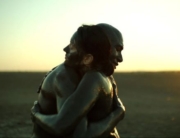Entertainment is one odd film. Possibly the weirdest I’ve seen in quite a while. If you can imagine the Coen Brothers’ deadpan stare, Sam Shepard’s white trash western goth aesthetic, and David Lynch’s dream-fuck phantasmagoria skillfully mulled together, you have an idea. Still, you will be shaking your head in disbelief at what you have just seen.
It stars Greg Turkington, aka alt-comedian Neil Hamburger, billed as the Comedian in the credits. He mopes across the Mojave Desert performing stand-up gigs in increasingly more depressing venues (in a prison, a bowling alley) as he becomes emotionally unhinged. Offstage, the Comedian (apologies to Alan Moore’s Watchmen) is monosyllabic and practically inert, and every human contact is excruciating and occasionally excruciatingly funny. Seeing him interact with his boisterous, successful cousin, played by John C. Reilly, is a pinnacle in embarrassment comedy, and not of the inept Ben Stiller variety. Here, you squirm in your seat before you burst out laughing from the Comedian’s inability to connect and the cousin’s complete inability to see past his humongous ego to even notice.
Onstage, the Comedian is a fulcrum of rage, taking on the persona of a 1970’s lounge comedian tossing out off-color and completely inane pop culture put downs and taking down audience members who he feels are interrupting his act. It’s a complete 180 from the comedian’s monochromatic waking life. Turkington (who co-wrote) and director Rick Alverson seem to making the point that one’s art, no matter how unsuccessful or unpleasant it is, is a necessary survival and coping mechanism, but it’s a balancing act, and if you lose your balance, you lose your mind.
The only real moments of poignancy and human connection occur when the Comedian occasionally calls his daughter and leaves messages. He lets his mask slip, and you see the vulnerable human underneath, though we are given to believe there may be some doubt to her existence. Entertainment is an exercise in ambiguity. It never gives you the full picture and never lets you get settled.
You pretty much have a handle on things only until about halfway through when the gigs become more hostile and the scenarios get increasingly bizarre and disjointed. There is a particularly difficult moment when the Comedian heckles a young woman who doesn’t deserve it. His attack is a seething cauldron of misogyny, and Alverson cuts to the woman being shamed as she is rooted to the spot taking every hit. It’s a bravura bit of filmmaking and also introduces a contradiction. Though our sympathy may be with the protagonist, he may well not deserve it.
The last third accomplishes a complete high dive into a sort of unnerving surrealism. There is a nightmarish party ending with the creepiest game of Marco Polo you may ever experience, an encounter with a pregnant woman that is discomforting and heartbreaking, and a birthday party that ultimately breaks the Comedian.
Entertainment is not a film to be liked or disliked. It is to be endured. It deliberately sets out to find your buttons and push the boundaries of your patience. It gives you a withdrawn and damaged protagonist, dares you to sympathize with him, and then slaps you down when you do. It also throws a defiant middle finger to mainstream filmmaking (well, anything mainstream, for that matter) and posits that we are all as lost and alienated as the Comedian, but at least he has the balls to take his alienation to its ultimate destination. It is an uncompromising film and a singular experience. And it is not pleasant at all.







Leave A Comment